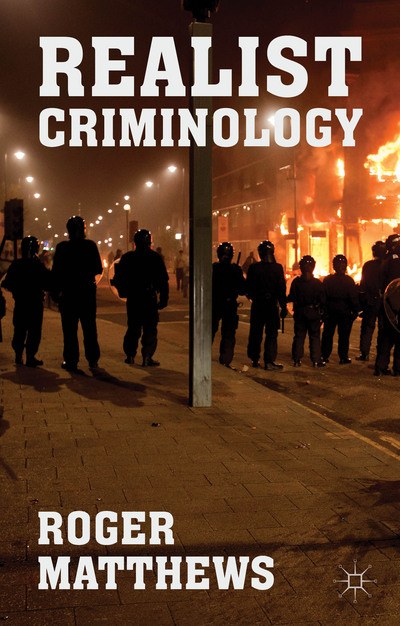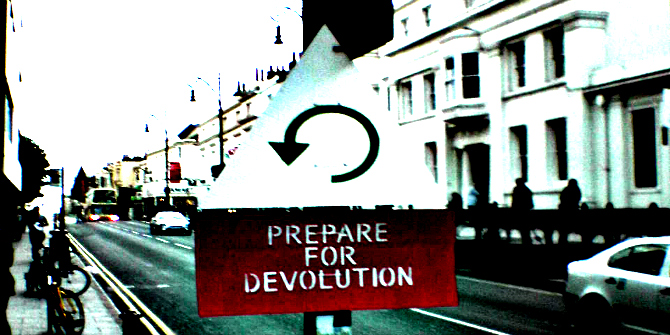Roger Matthews’ Realist Criminology offers a timely, provocative and essential call to arms for scholars of many disciplines who seek to understand crime, to inform crime prevention policy, and to develop fairer criminal justice practices, writes Helen Brown Coverdale.

Roger Matthews, Professor of Criminology at the University of Kent, pioneered left realist criminology, and remains one of its leading lights. His latest book, Realist Criminology, has been welcomed by the profession as ‘timely and wide ranging’ (Elliott Currie, University of California), and an exciting and ‘provocative challenge to mainstream criminology’ (Lucia Zender, University of Oxford). The book provides a rallying cry for critical realist methodological approaches to criminology. Realist criminology, it is argued, offers a more theoretically engaged, critical, and practical approach to criminology, able to actively engage in informing evidenced-based policy.
Throughout the book Matthews rails against what he terms ‘so what’ criminology: theoretically thin approaches that fail to engage beyond the academic criminology community with crime prevention policy discussion. The realist alternative he offers we might think of as ‘no nonsense’ criminology, which very much reflects his writing style. He concisely communicates a great deal in this slim volume. Matthews begins by placing the field of criminology in context, with three chapters covering in turn the history, theoretical frameworks, and methods of criminology. Following these, two chapters track the development of theoretical and methodological approaches to the subject, from administrative approaches to sociological and culturally informed approaches, and then from culturally limited approaches towards a realist approach. Finally, two thematic chapters critically examine core issues in dominant criminology, the concepts of punitiveness and governance through crime, and argue for adopting a realist alternative.
The first chapter offers a potted history of the field, demonstrating that many leading criminologists of different approaches do not agree on exactly when or how the field began. Matthews identifies four broad approaches to defining and carrying out criminological study, which have and in the main continue to bump along in an ‘uneasy tension’ (p3). These are positivist administrative criminology, a range of liberal approaches, conservative criminology (which the author relishes branding as ‘naive right realism’), and the critical realist perspective. These four approaches structure the chapters on theory and method that follow, as well as the two chapters which then track the development of criminological practice from administrative criminology, through cultural and sociological approaches, towards the necessity of critical realism. The whistle-stop tour is necessarily brief, but gives a general sense of each position and offers a critical review of its strengths and weaknesses. Critical realism itself gets a well signposted exposition towards the end of the methodology chapter ‘The problem of Method’.

Administrative and liberal criminology have dominated, it is argued, limiting criminological research according to the weaknesses of each position. Two core themes, dominant in mainstream criminology, are heavily criticised. Matthews criticises punitiveness as an insufficiently defined concept, whereas governance through crime focuses too narrowly and indiscriminately on crime and criminalisation, overlooking the relevance of other changes, such as crime prevention and changes to national and international regulation. Matthews also identifies the recent decline of US prison populations as poorly explained by this scholarship. Yet his chief critiques are that liberal and administrative criminology in general fall short. Firstly, insufficient theoretical underpinnings, give rise to conceptual blind spots in the research. Secondly, narrow studies lack policy application, creating an inability for administrative and liberal criminology to speak to policy and practice.
I was fortunate enough to attend a seminar on the core themes of the book, presented by the author, whilst preparing this review. The well-received seminar was described warmly by the chair through twitter as a ‘magnificent rant’, which eloquently captures the feel of the book. Matthews is exceptionally clear on what the problems with liberal and administrative approaches are, but less clear on exactly how a realist response can offer correction. Arguments identifying weaknesses that critical realist approaches could address are offered in the final two chapters, but with little detail about what we should expect from a realist revision. In fairness, Matthews’ aim is to encourage more realist criminology from other scholars, not to undertake it all himself. But a brief sketch of one possible shape realist revisions might take, and what these might be expected to contribute, would help illustrate the importance of applying critical realist approaches to the imperfections identified in current criminology. Alternatively, a realist argument subjected to the same treatment as the other positions might have been helpful, in order to see more clearly the comparison with other perspectives. This brings me to my only complaint: the book feels too short for all of the review, detailed criticism and essential correction Matthews seeks to make.
There was always going to be a lot of ground to cover in only just over 200 pages, given the diversity of even the dominant strands of criminology. Each perspective is briefly introduced, sometimes in ways which may suggest to novice readers a greater homogeneity than is necessarily the case. Matthews’ engrossing ‘no nonsense’ style – highly effective for his critical approach and methodologically necessary for the theoretically informed and practically engaged criminology he advocates – can sometimes appear to briskly reject swathes of diverse research with one criticism. I am certain over generalization is not Matthews’ intent and further that his criticisms are highly pertinent and often friendly. But the rapid pace and generalizations necessary for brevity sometimes threaten to unnecessarily undermine the critical power of his insightful and important argument.
This book is, however, significant for those who study criminology at all levels. The book succinctly sets out core positions broadly taken by scholars following particular key approaches to criminological thought, and offers a neat package of the chief criticisms of each perspective. This will make the book an excellent teaching tool for both introducing criminological perspectives and their criticisms, and for students beginning to articulate their own critical thought. Matthews’ Realist Criminology further offers a timely, provocative and essential call to arms for scholars of many disciplines who seek to understand crime, to inform crime prevention policy and to develop fairer criminal justice practices.
Helen Brown Coverdale completed her PhD in the Law Department at LSE in 2014. Her AHRC funded doctoral research applied the practical moral reasoning of care ethics to sentencing and punishment practices, to better provide Dworkin’s treatment as equals to offenders. She holds a BA from the University of Manchester and an MA in Legal & Political Theory from UCL. Helen has worked as a Parliamentary Researcher, and also for Nacro, the crime reduction charity. Her research interests in legal & political theory include: applied penal philosophy, care and relational ethics, relational equality, rights and duties, public ethics, citizenship and human rights.







